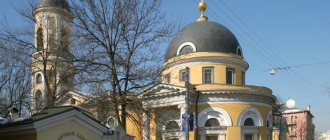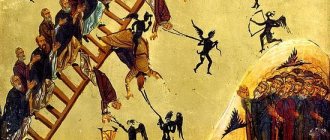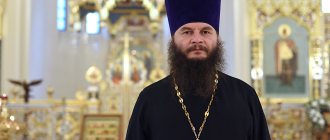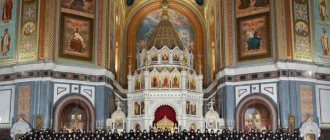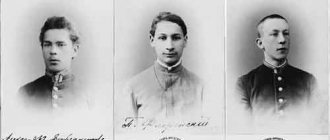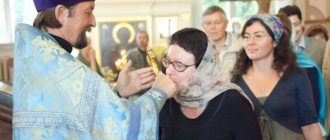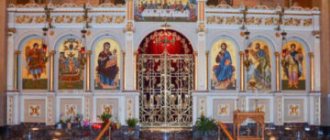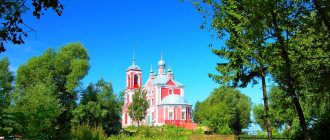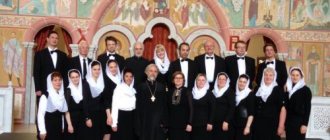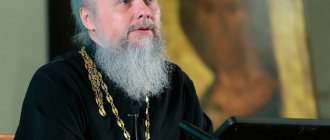| prot. Alexander Abramov |
Alexander Alexandrovich Abramov
(born 1973), archpriest, rector of the Moscow St. Sergius Church in Krapivniki, member of the Inter-Council Presence of the Russian Orthodox Church, secretary of the Synodal Commission on Bioethics Born on July 9, 1973 in Moscow. In 1990 he graduated from high school.
In 1995 he graduated with honors from the Faculty of History of Moscow State University. M.V. Lomonosov. In 1995-1998 he studied in his graduate school.
In 2000 he entered the Moscow Theological Seminary, and upon graduation in 2001, he entered the Moscow Theological Academy.
On April 22, 2000, he was ordained as a deacon by Metropolitan Pitirim (Nechaev) of Volokolamsk and Yuryevsk, and appointed full-time cleric of the Martha and Mary Convent of Mercy in Moscow. He was responsible for the international contacts of the monastery and its social programs. He taught moral theology in a number of theological educational institutions in Moscow.
From 2001 to 2003 - employee of the Department for External Church Relations of the Moscow Patriarchate. Responsible for relations with the Roman Catholic Church, teacher at the MDA graduate school at DECR.
On April 28, 2002, he was ordained to the priesthood by Metropolitan Kirill (Gundyaev) of Smolensk and Kaliningrad. He served as a cleric of the Church of the Life-Giving Trinity in Khoroshevo, Moscow.
From 2002 to 2005, he was a member of the editorial board of the DECR magazine “Church and Time” and a regular contributor to religious programs on Radio Russia.
In 2003, he was appointed clergyman of St. Nicholas Patriarchal Cathedral in New York, USA.
In 2003-2005 he was the keymaster of the cathedral.
Since 2003 - employee, from 2004 to 2009 - secretary of the MP Representative Office in the USA.
In 2005, he was appointed representative of the World Russian People's Council to the UN.
In 2007, he was elevated to the rank of archpriest.
From July 27, 2009 to October 23, 2014, he was a member of the Inter-Council Presence of the Russian Orthodox Church.
In 2009-2010, he served as the representative of the Moscow Patriarchate in the USA, combining this work with serving as rector of St. Nicholas Patriarchal Cathedral in New York.
On March 5, 2010, he was recalled from the United States due to the end of his assignment. On September 1, 2010, he was appointed acting First Deputy Chairman of the Department of Religious Education and Catechesis of the Russian Orthodox Church.
On October 6, 2010, he was appointed first deputy chairman of the Synodal Department of Religious Education and Catechesis.
On December 27-28, 2011, he was relieved of his post as first deputy chairman of the Synodal Department of Religious Education and Catechesis.
He participated in the work of the Commission for the care of the Russian-speaking flock in America, created by decisions of the Synods of the Russian Orthodox Church and the Orthodox Church in America, as well as the Commission to study the parish situation in Ottawa, Canada, created by decisions of the Synods of the Russian Orthodox Church and the Russian Church Abroad.
He was repeatedly a member of delegations of the Russian Orthodox Church, participating in various church-foreign policy, inter-confessional, inter-Christian and Orthodox events, as well as scientific conferences.
He served as an expert in the delegations of the Russian Federation at the 61-64th sessions of the UN General Assembly and its relevant institutions: the Third Committee, the Committee of Non-Governmental Organizations, the Alliance of Civilizations, UNESCO, the Tripartite Forum on Interreligious and Intercultural Dialogue for Peace, the Council of Rights person. He took part in the preparation of a number of UN General Assembly resolutions on religious issues. Vice-President of the Committee of Religious Non-Governmental Organizations Accredited to the UN.
The rector of the temple is St. Sergius of Radonezh in Krapivniki, Moscow.
On June 17, 2022, he was included in the Synodal Commission on Bioethics and approved as its secretary [1].
Author of a number of publications in Russian and foreign publications.
Archpriest Alexander Abramov
The rector of the temple is St. Sergius of Radonezh in Krapivniki.
Born on July 9, 1973 in Moscow.
In 1990-1995 studied at the Faculty of History of Moscow State University. M.V. Lomonosov. In 1995-1998 Studied in graduate school at the Faculty of History of Moscow State University.
In 2000 he entered the Moscow Theological Seminary, after graduating in 2001 he entered the Moscow Theological Academy.
On April 22, 2000, on Lazarus Saturday, Metropolitan Pitirim of Volokolamsk and Yuryev was ordained a deacon and appointed full-time cleric of the Martha and Mary Convent of Mercy in Moscow. He was responsible for the international contacts of the monastery and its social programs. He taught moral theology in a number of theological educational institutions in Moscow.
In 2001-2003 - employee of the Department for External Church Relations of the Moscow Patriarchate, responsible for relations with the Roman Catholic Church, teacher of the graduate school of the Moscow Academy of External Church Relations at the DECR.
On April 28, 2002, on Palm Sunday, Metropolitan Kirill of Smolensk and Kaliningrad (now His Holiness Patriarch of Moscow and All Rus') ordained him to the priesthood. He served as a cleric of the Church of the Life-Giving Trinity in Khoroshevo in Moscow.
In 2002-2005 — Member of the editorial board of the DECR magazine “Church and Time”, regular contributor to religious programs on Radio Russia.
In 2003, by decision of the Holy Synod, he was appointed clergyman of the St. Nicholas Patriarchal Cathedral in New York. In the same year he was awarded the right to wear a pectoral cross. In 2003-2005 bore the obedience of the keymaster of the cathedral.
In 2003-2004 - employee, 2004-2009 - Secretary of the Representative Office of the Russian Orthodox Church in the USA. In 2005, he was appointed representative of the World Russian People's Council to the UN.
In 2007 he was elevated to the rank of archpriest.
By order of His Holiness Patriarch Kirill in 2009-2010. acted as a representative of the Russian Orthodox Church in the USA, combining this work with the obedience of the rector of St. Nicholas Patriarchal Cathedral in New York. In 2010 he was awarded the right to carry a club.
By the decision of the Holy Synod of March 5, 2010 (journal No. 27), he was recalled from the United States due to the end of his business trip and sent to the disposal of His Holiness the Patriarch.
On September 1, 2010, with the blessing of His Holiness Patriarch Kirill, he was appointed acting. First Deputy Chairman of the Department of Religious Education and Catechesis of the Russian Orthodox Church.
By the decision of the Holy Synod of October 6, 2010 (journal No. 99), he was appointed first deputy chairman of the Department of Religious Education and Catechesis of the Russian Orthodox Church.
By the decision of the Holy Synod of December 27-28, 2011 (magazine No. 176), he was relieved of the post of first deputy chairman of OROiK.
Member of the Inter-Council Presence. He participated in the work of the Commission for the care of the Russian-speaking flock in America, created by decisions of the Synods of the Russian Orthodox Church and the Orthodox Church in America, as well as the Commission to study the parish situation in Ottawa, Canada, created by decisions of the Synods of the Russian Orthodox Church and the Russian Church Abroad.
He was repeatedly a member of delegations of the Russian Orthodox Church, participating in various church-foreign policy, inter-confessional, inter-Christian and Orthodox events, as well as scientific conferences.
He served as an expert in the delegations of the Russian Federation at the 61-64th sessions of the UN General Assembly and its relevant institutions: the Third Committee, the Committee of Non-Governmental Organizations, the Alliance of Civilizations, UNESCO, the Tripartite Forum on Interreligious and Intercultural Dialogue for Peace, the Council on human rights. He took part in the preparation of a number of UN General Assembly resolutions on religious issues. Vice-President of the Committee of Religious Non-Governmental Organizations Accredited to the UN.
Author of a number of publications in Russian and foreign publications.
Awards: Order of St. Innocent of Moscow II Art. Orthodox Church in America; Order "1020 years of the Baptism of Rus'" of the UOC.
Russian Orthodox Church
Born on July 9, 1973 in Moscow. In 1990 he graduated from high school.
In 1990-95 studied at the Faculty of History of Moscow State University. M.V. Lomonosov. In 1995-98 Studied in graduate school at the Faculty of History of Moscow State University.
In 2000 he entered the Moscow Theological Seminary, after graduating in 2001 he entered the Moscow Theological Academy.
On April 22, 2000, on Lazarus Saturday, Metropolitan Pitirim of Volokolamsk and Yuryev was ordained a deacon and appointed full-time cleric of the Martha and Mary Convent of Mercy in Moscow. He was responsible for the international contacts of the monastery and its social programs. He taught moral theology in a number of theological educational institutions in Moscow.
In 2001-2003 - employee of the Department for External Church Relations of the Moscow Patriarchate, responsible for relations with the Roman Catholic Church, teacher of the graduate school of the Moscow Academy of External Church Relations at the DECR.
On April 28, 2002, on Palm Sunday, Metropolitan Kirill of Smolensk and Kaliningrad (now His Holiness Patriarch of Moscow and All Rus') ordained him to the rank of priest. He served as a cleric of the Church of the Life-Giving Trinity in Khoroshevo in Moscow.
In 2002-2005 — Member of the editorial board of the DECR magazine “Church and Time”, regular contributor to religious programs on Radio Russia.
In 2003, by decision of the Holy Synod, he was appointed clergyman of the St. Nicholas Patriarchal Cathedral in New York. In 2003-2005 bore the obedience of the keymaster of the cathedral.
In 2003-2004 - employee, 2004-2009 - Secretary of the Representative Office of the Russian Orthodox Church in the USA. In 2005, he was appointed representative of the World Russian People's Council to the UN.
In 2007 he was elevated to the rank of archpriest.
By order of His Holiness Patriarch Kirill in 2009-10. acted as a representative of the Russian Orthodox Church in the USA, combining this work with the obedience of the rector of the St. Nicholas Patriarchal Cathedral in New York.
By the decision of the Holy Synod of March 5, 2010 (journal No. 27), he was recalled from the United States due to the end of his assignment and sent to the disposal of His Holiness the Patriarch.
On September 1, 2010, with the blessing of His Holiness Patriarch Kirill, he was appointed acting. First Deputy Chairman of the Department of Religious Education and Catechesis of the Russian Orthodox Church.
By the decision of the Holy Synod of October 6, 2010 (journal No. 99), he was appointed first deputy chairman of the Department of Religious Education and Catechesis of the Russian Orthodox Church.
By the decision of the Holy Synod of December 27-28, 2011 (magazine No. 176), he was relieved of the post of first deputy chairman of OROiK.
Member of the Inter-Council Presence. He participated in the work of the Commission for the care of the Russian-speaking flock in America, created by decisions of the Synods of the Russian Orthodox Church and the Orthodox Church in America, as well as the Commission to study the parish situation in Ottawa, Canada, created by decisions of the Synods of the Russian Orthodox Church and the Russian Church Abroad.
He was repeatedly a member of delegations of the Russian Orthodox Church, participating in various church-foreign policy, inter-confessional, inter-Christian and Orthodox events, as well as scientific conferences.
He served as an expert in the delegations of the Russian Federation at the 61-64th sessions of the UN General Assembly and its relevant institutions: the Third Committee, the Committee of Non-Governmental Organizations, the Alliance of Civilizations, UNESCO, the Tripartite Forum on Interreligious and Intercultural Dialogue for Peace, the Council on human rights. He took part in the preparation of a number of UN General Assembly resolutions on religious issues. Vice-President of the Committee of Religious Non-Governmental Organizations Accredited to the UN.
In 2019-20 — Deputy Rector of the Moscow Theological Academy for Development.
He teaches at the Moscow and Sretensky Theological Academies.
By the decision of the Holy Synod of June 17, 2022 (journal No. 44), he was appointed secretary of the Synodal Commission on Bioethics.
Notes
- [www.patriarchia.ru/db/text/1909396.html JOURNALS of the meeting of the Holy Synod of December 27-28, 2011 / Official documents / Patriarchia.ru]
- [www.patriarchia.ru/db/text/705058.html Composition of the Inter-Council Presence of the Russian Orthodox Church / Official documents / Patriarchia.ru]
- [www.pravmir.ru/kak-izmenilsya-sostav-mezhsobornogo-prisutstviya-russkoy-pravoslavnoy-tserkvi/ How has the composition of the Inter-Council presence of the Russian Orthodox Church changed? | Orthodoxy and peace]
Excerpt characterizing Abramov, Alexander Alexandrovich (priest)
- Hey, who's there? Come in, come in! What's new? – the field marshal called out to them. While the footman lit the candle, Tol told the contents of the news. - Who brought it? - asked Kutuzov with a face that struck Tolya, when the candle lit, with its cold severity. “There can be no doubt, your lordship.” - Call him, call him here! Kutuzov sat with one leg hanging off the bed and his big belly leaning on the other, bent leg. He squinted his seeing eye to better examine the messenger, as if in his features he wanted to read what was occupying him. “Tell me, tell me, my friend,” he said to Bolkhovitinov in his quiet, senile voice, covering the shirt that had opened on his chest. - Come, come closer. What news did you bring me? A? Has Napoleon left Moscow? Is it really so? A? Bolkhovitinov first reported in detail everything that was ordered to him. “Speak, speak quickly, don’t torment your soul,” Kutuzov interrupted him. Bolkhovitinov told everything and fell silent, awaiting orders. Tol began to say something, but Kutuzov interrupted him. He wanted to say something, but suddenly his face squinted and wrinkled; He waved his hand at Tolya and turned in the opposite direction, towards the red corner of the hut, blackened by images. - Lord, my creator! You heeded our prayer...” he said in a trembling voice, folding his hands. - Russia is saved. Thank you, Lord! - And he cried. From the time of this news until the end of the campaign, all of Kutuzov’s activities consisted only in using power, cunning, and requests to keep his troops from useless offensives, maneuvers and clashes with the dying enemy. Dokhturov goes to Maloyaroslavets, but Kutuzov hesitates with the entire army and gives orders to cleanse Kaluga, retreat beyond which seems very possible to him. Kutuzov retreats everywhere, but the enemy, without waiting for his retreat, runs back in the opposite direction. Historians of Napoleon describe to us his skillful maneuver at Tarutino and Maloyaroslavets and make assumptions about what would have happened if Napoleon had managed to penetrate the rich midday provinces. But without saying that nothing prevented Napoleon from going to these midday provinces (since the Russian army gave him the way), historians forget that Napoleon’s army could not be saved by anything, because it already carried in itself the inevitable conditions death. Why is this army, which found abundant food in Moscow and could not hold it, but trampled it underfoot, this army, which, having come to Smolensk, did not sort out the food, but plundered it, why could this army recover in the Kaluga province, inhabited by those the same Russians as in Moscow, and with the same property of fire to burn what they light? The army could not recover anywhere. Since the Battle of Borodino and the sack of Moscow, it already carried within itself the chemical conditions of decomposition. The people of this former army fled with their leaders without knowing where, wanting (Napoleon and each soldier) only one thing: to personally extricate themselves as soon as possible from that hopeless situation, which, although unclear, they were all aware of. That is why, at the council in Maloyaroslavets, when, pretending that they, the generals, were conferring, presenting different opinions, the last opinion of the simple-minded soldier Mouton, who said what everyone thought, that it was only necessary to leave as soon as possible, closed all their mouths, and no one , even Napoleon, could not say anything against this universally recognized truth. But although everyone knew that they had to leave, there was still the shame of knowing that they had to run. And an external push was needed that would overcome this shame. And this push came at the right time. This was what the French called le Hourra de l'Empereur [the imperial cheer]. The next day after the council, Napoleon, early in the morning, pretending that he wanted to inspect the troops and the field of the past and future battle, with a retinue of marshals and a convoy, rode along the middle of the line of troops. The Cossacks, snooping around the prey, came across the emperor himself and almost caught him. If the Cossacks did not catch Napoleon this time, then what saved him was the same thing that was destroying the French: the prey that the Cossacks rushed to, both in Tarutino and here, abandoning people. They, not paying attention to Napoleon, rushed to the prey, and Napoleon managed to escape. When les enfants du Don [the sons of the Don] could catch the emperor himself in the middle of his army, it was clear that there was nothing more to do but to flee as quickly as possible along the nearest familiar road. Napoleon, with his forty-year-old belly, no longer feeling his former agility and courage, understood this hint. And under the influence of the fear that he gained from the Cossacks, he immediately agreed with Mouton and gave, as historians say, the order to retreat back to the Smolensk road. The fact that Napoleon agreed with Mouton and that the troops went back does not prove that he ordered this, but that the forces that acted on the entire army, in the sense of directing it along the Mozhaisk road, simultaneously acted on Napoleon. When a person is in motion, he always comes up with a goal for this movement. In order to walk a thousand miles, a person needs to think that there is something good beyond these thousand miles. You need an idea of the promised land in order to have the strength to move. The promised land during the French advance was Moscow; during the retreat it was the homeland. But the homeland was too far away, and for a person walking a thousand miles, he certainly needs to say to himself, forgetting about the final goal: “Today I will come forty miles to a place of rest and lodging for the night,” and on the first journey this place of rest obscures the final goal and concentrates on yourself all the desires and hopes. Those aspirations that are expressed in an individual always increase in a crowd. For the French, who went back along the old Smolensk road, the final goal of their homeland was too distant, and the nearest goal, the one to which all desires and hopes strove, in huge proportions intensifying in the crowd, was Smolensk. Not because people knew that there was a lot of provisions and fresh troops in Smolensk, not because they were told this (on the contrary, the highest ranks of the army and Napoleon himself knew that there was little food there), but because this alone could give them the strength to move and endure real hardships. They, both those who knew and those who did not know, equally deceiving themselves as to the promised land, strove for Smolensk. Having reached the high road, the French ran with amazing energy and unheard-of speed towards their imaginary goal. Besides this reason of common desire, which united the crowds of French into one whole and gave them some energy, there was another reason that bound them. The reason was their number. Their huge mass itself, as in the physical law of attraction, attracted individual atoms of people. They moved in their hundred thousandth mass as an entire state.
